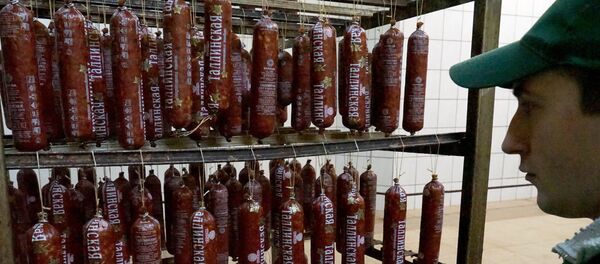The study, conducted by researchers at the University of Guelph and commissioned by the Canadian Food Inspection Agency (CFIA), examined 100 randomly-picked sausages labeled as consisting of just one ingredient — beef, pork, chicken or turkey.
The CFIA commissioned the study after a notorious 2013 European horsemeat scandal in which food labeled as beef was found to either partly or completely consist of horse meat.
"The vast majority — 95 percent of the sausages we tested — had the species that was on the label in them," Robert Hanner, lead author of the study, told CTV News Channel. "But about 20 percent had certain amounts of other animals in them, Hanner said.
"We found that some of the beef sausages contained pork; some of the pork sausages contained beef," he said, adding, "The good news is that typically beef sausages predominantly contain beef, but some of them also contain pork, so for our kosher and halal consumers, that is a bit disconcerting."
Of 27 beef sausages examined, seven were found to contain pork. Out of 20 chicken sausages studied, four contained turkey and one had beef. Five of 15 turkey sausages studies did not contain any turkey at all — they were chicken. Out of the 38 allegedly-pure pork sausages, one, alarmingly, contained horse meat.
The researchers only tested for the DNA of turkey, chicken, pork, beef and horse, and it is not known whether the sausages contained any other meats.
The undeclared meats in the sausages were not found in trace amounts either; but in the one-to-five percent range.
"The levels we're seeing aren't because the blades on the grinder aren't perfectly clean," Hanner asserted.
The CFIA was not surprised by the study results. Inspection agency executive director of food safety science Aline Dimitri explained, "We know from international intelligence that this happens and we're not immune to these things. Luckily when we looked at the prevalence based on that little set that we took, we are in much better shape than other countries."
The rate of mislabeling in Europe is much higher than in the Canadian study, however, as European studies have shown that 70 percent of samples contain undeclared ingredients.
The manufacturer that sold chicken sausages labeled as turkey sausages was using improperly maintained production records, according to the CFIA, while the sausage containing horse meat was produced by a company that could not be investigated because it had already voluntarily stopped all of its operations.
The study, although undeniably eye-opening, has its limitations.
"This is a very small study and research-focused and not designed to really have a baseline on what's happening out there," Dimitri cautioned.
The study showed promising results in terms of scientific tools used to differentiate between ingredients, however.
"[The tools] can actually differentiate properly between different meats, it can give us a sense of what's in there," Dimitri added.
The CFIA has suggested that it will conduct a more extensive study in the future.



